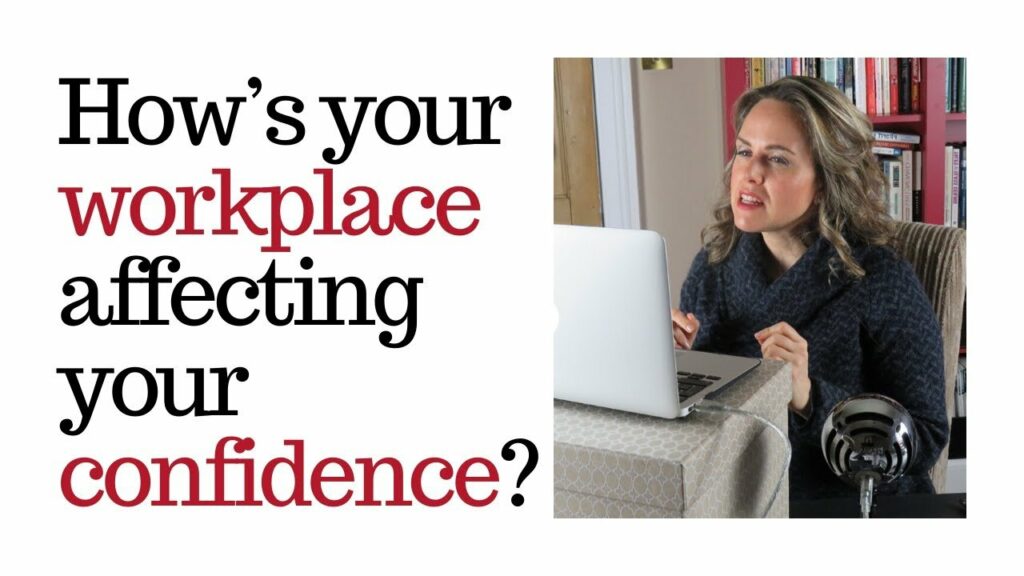The environment where you work, can have a MASSIVE impact on your confidence.
Today, we’re going to look at how to build confidence at work by looking at your surroundings in 3 different ways. This WILL advance your career by getting you to think about how each setting affects your confidence differently every day. And if you stay to the end, you’ll hear how a new multi-million pound state of the art building I visited got it so wrong in one simple aspect of their layout, and how an easy £10 fix could have remedied the whole thing.
As a speaker and someone who’s done over 2500 hours of executive coaching with my clients, I have talked with thousands of professional women. Interestingly, the environment in which these women work comes up time and time again and the most successful ones get the way it affects them, like I know you will.
So today we’re going to talk about 3 different environments in which you may work, and our expectations in manoeuvring through those settings in different ways. These places, will surprisingly, all shed light on how much confidence you may feel in your current role.
You may be like many of my clients in that you originally think a lack of confidence is a personal failing, but it isn’t – yet ‘lacking confidence’ is often blamed for someone not getting ahead – but in doing so, we often ignore the context of where they work. Instead of leaders blaming someone for being under-confident or not ambitious enough, leaders should be asking:
‘what is it in our system, our company culture and as we’re addressing here, even our physical environment that means that person feels like an outsider, a fraud, an imposter – someone who may not progress here?’
1. So let’s start with the widest of the physical environments you are expected to traverse to get ahead – and that includes any meetings you need to attend outside of your office. For example, many of my clients work long hours either in their own or in client’s offices. If this is you, does your employer offer free taxi service for people to use after hours, or hotel stays if you are expected to work late?
What are your employer’s expectations around this and how does that affect your confidence?
For example, do you need to travel at the weekend in order to be in the far-flung office bright and early on Monday morning or attend conferences that straddle weekends? This is a big one, particularly for parents, carers or those with disabilities, for example. However, the importance of accessibility goes beyond the basics of having wheelchair access for a client’s office or a loop for the hearing impaired.
It’s also down to the expectations employees are judged by. This came out when I interviewed Toby Mildon for ‘The Con Job’. Toby is a D&I professional, and author of ‘Inclusive Growth’. He’s also a quadriplegic. In our interview he talked me through how ‘travelling for meetings’ is a physical expectation of most jobs he’s had, but can be pretty exhausting. He said to me: ‘If two people go on a train journey, the person who has a physical disability is going to find every aspect much harder. They have to get through turnstiles, get a ramp on board, make sure the accessible toilets are nearby and indeed working ‒ all before they even get to the station.
All of this puts an additional mental load on them. There is just so much more to think about at every stage, not to mention more strangers to rely upon.’ So in terms of your own confidence at work, particularly if you travel for your job, the tip here is to have discussions with your colleagues and employers, not just about your desk, your office, or even your building but all the other places you are expected to visit. This is important for all of us.
Ask a question like ‘What are the assumptions about things like safety, transport, accessibility, weekend working, travel time, even childcare provision that we’re making when we send people to work in these other locations? These can be great opportunities, so don’t get me wrong, but write down a list of all the ways you think your boss would answer this question, and if you can live with those answers.
Before then talking to your boss, check out your assumptions with other colleagues who have also travelled for work to see how accurate your assumptions actually are. Get their advice on how they made travelling for work, actually work for them.
Their answers may surprise you, or give you the inspiration/ammunition you need when talking to your boss, which will build your confidence at work, before you go into that conversation.
2. So moving onto a setting a bit closer to home, and that’s the office buildings and the surrounding environment. This might even be the campus on which you work, and how well it’s set up for people like you. I recall working with Janet a client from a few years ago, who was confident in herself, but not confident in her employer- which is a big distinction people don’t talk enough about. In a coaching session, she shared what she initially saw as a small annoyance, but is a reality for employees, and in my experience, particularly problematic for working women.
Janet told me ‘I’m expected to work late, and don’t actually mind it as it enables me to get my kids off to school in the morning. What bothers me is that it’s always dark when I leave, and when I asked my boss why the car park wasn’t lit, he said it was expensive and wasn’t a priority as none of the guys I worked with had ever asked.’
For Janet, this was more annoying after her boss then installed a vintage videogame machine in the office, another big expense. His rationale was that he wanted to make the office homely and inviting, but for her boss, homely and inviting didn’t extend to a lit car park. When we faced this challenge (but before the video game machine), I advised her to tell her boss how a lit car park would keep everyone safer, and might even attract more women to the company, something they ostensibly cared about.
She spoke with her boss, and the conversation was illuminating. His response showed what a low priority safety was for him, and it signalled to her that he’d probably never listen to her as much as others, which meant her confidence would never flourish there. And that’s a surprising point worth remembering, these conversations don’t always have to go your way to be really valuable.
In fact, her boss’s reaction or lack thereof, became part of the impetus for her to go. Janet left about six months later, and while it wasn’t the main reason she left, this environmental issue played a part. Janet’s story is quite common, and it would be great for others in the community to know that they’re not alone.
3. The third tip around your environment is to look at what the layout of the building itself and maybe even your office specifically, says about who succeeds here. We all know stories of uncommunicative senior people that are not helped by having their offices on the loftiest floors or how open plan offices can be distracting for introverts but there are often other hints around an office as to the expectations of who will succeed.
A few years ago, I got a tour of some swanky new offices of a European client’s before anyone had moved in. On the tour, they talked about how they had future proofed the building for security, connectivity and all other possible eventualities. We took in the views from the new CEO’s office but in doing so noticed that on the door of the CEO’s private toilet was the ubiquitous men’s toilet sign.
Clearly, the designers had thought to future-proof the building, but in making this small choice, they had sent the subconscious message that they were future proofing against the expectation they’d ever have a female CEO! Now obviously, a £10 door sign change would have been all it took, perhaps one removing gender completely, but their choice sent a message as to who they expected to literally and figuratively, be sitting on that lofty throne, and who they didn’t expect to see there.
An easy tip for leaders when you are looking at taking new office space is to ask an objective outsider to take a look at the space, the environment and ask ‘Who do you think would do well here?’. Ultimately, look at your existing office environment. What does it tell you? Is it a setting in which you can see yourself progressing?
Thanks for reading, and you can go check out my Youtube videos for more!



